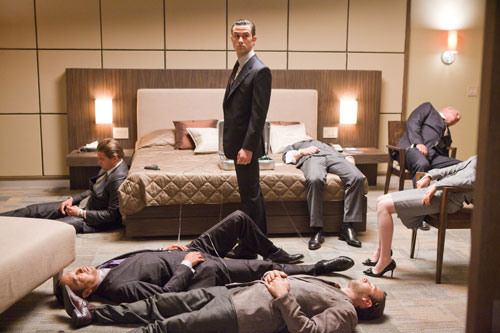
Upon its release nearly six years ago, “Inception” was all anybody could talk about. The film was unlike anything that had come before it, yet had seemingly everything you could ask for from a summer blockbuster: a naturally cool style, a marvelous cast, and a premise that pinned audiences to their seats and dominated their minds long after they left the theater. However, looking back at the film now, free of its release mania, one starts to see the cracks in Christopher Nolan’s supposed magnum opus. While the film is as often spectacular as it seemed that summer long ago, it’s now obvious faults reveal “Inception” as a well-crafted, but ultimately overly ambitious mindbender.
Part of what made the hype around this film so palpable was the worldwide adoration of Christopher Nolan. A subdued and patient writer-director whose early classic thrillers “Memento” and “Insomnia” captured the attention of arthouse and mainstream patrons alike, he broke out of his shell and cemented his immense talent by breathing new and complex life into Batman with “Batman Begins” and “The Dark Knight.” The world loved him for it, and when news broke that the filmmaker was coming up with a dream-based thriller starring none other than Leonardo DiCaprio as a thief named Cobb who steals and plants people’s ideas from their minds, the masses collectively went hysterical. Nolan deserves all the credit showered upon him, and “Inception” is a fine example of his best traits as a filmmaker. The film has some of the finest pacing, editing and production design ever concocted for a movie of this scale. The world Nolan creates is so magnificent because it is simultaneously fantastical and realistic, allowing the audience to identify with its characters and environment and not lose connection with it when things take a turn for the strange. In turn, the film exposes some of Nolan’s biggest faults as well, mistakes that in retrospect were tidily hid by hype as well as the shock and awe of witnessing this highly original world for the first time.
Nolan has always been ambitious, and “Inception” is without a doubt his most complicated film of all in terms of originality. This isn’t always a positive for the film, however, as the film’s difficulty in explaining its grand designs make the proceedings feel a little bit forced and awkward today.
The premise and backstory behind Cobb and company’s world is so complex that a great deal of the dialogue has to provide slightly hammy exposition explaining how everything works, removing some of the nuance from the writing and often providing the film’s actors with very little to work with. It was hard to spot this upon initial viewings, as all of the ideas being explained were so fascinating that it was distracting, but watching the film now makes you realize that the film’s dialogue and subsequent acting is actually kind of mediocre and pales in comparison to other Nolan works. What makes this interesting now is Nolan’s superior “Interstellar”, released years later and just as profound, is not nearly as guilty in this regard. That film is such a success because it always takes the time to focus on emotional resonance, whereas “Inception” is mostly a popcorn movie disguised as a masterpiece. This is perhaps why the film, once a dominant pop culture force, is little remembered or discussed today.
All these years later, it’s still hard to deny that this dream world is a meticulously designed piece of filmmaking, one that shook the foundations of summer blockbusters and ultimately pressured big-budget movies to be smarter. Despite this, “Inception” is ultimately a lesson in the triumphs and follies and ambition: dreaming big will create worlds beyond comprehension, but sometimes at the expense of the little details that make these worlds truly masterful.











